Find Help
More Items From Ergsy search
-
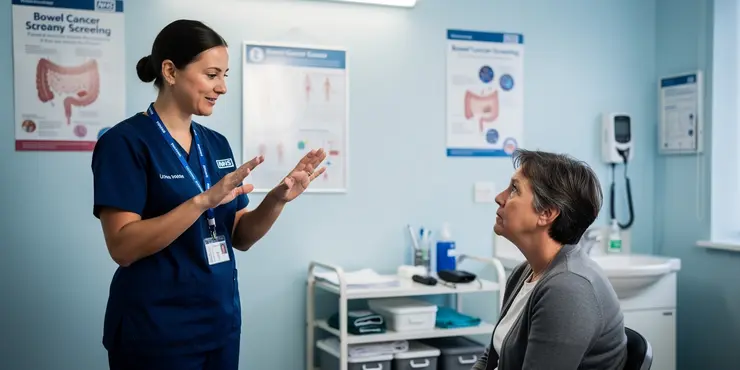
Learn about bowel cancer (British Sign Language version)
Relevance: 100%
-

Is the DVSA Theory Test available in British Sign Language (BSL)?
Relevance: 73%
-
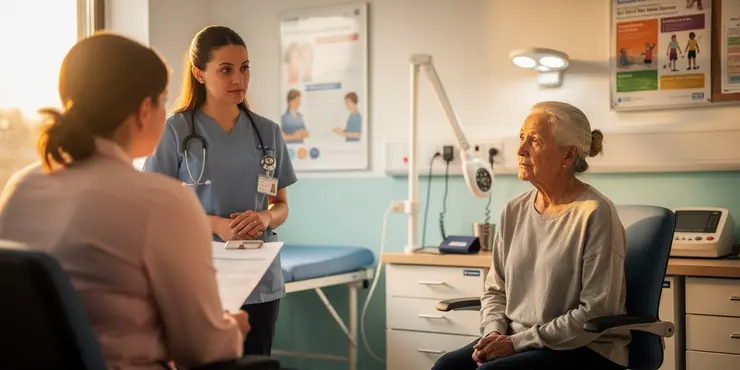
Bowel cancer - Symptoms and signs to look out for
Relevance: 63%
-
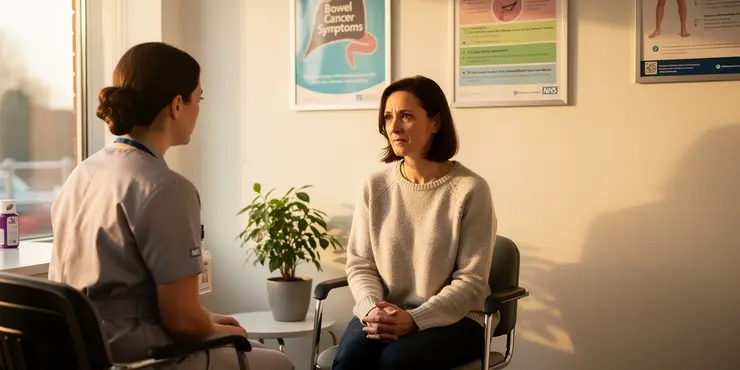
What is Bowel Cancer?
Relevance: 53%
-
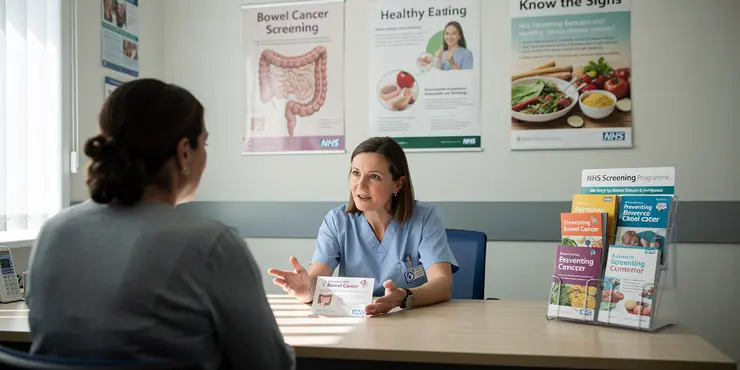
Can bowel cancer be prevented?
Relevance: 52%
-
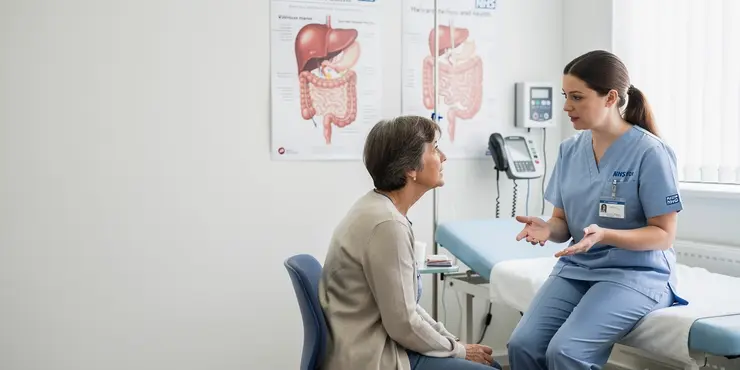
Is diet linked to the rise in bowel cancer?
Relevance: 51%
-

How common is bowel cancer?
Relevance: 50%
-
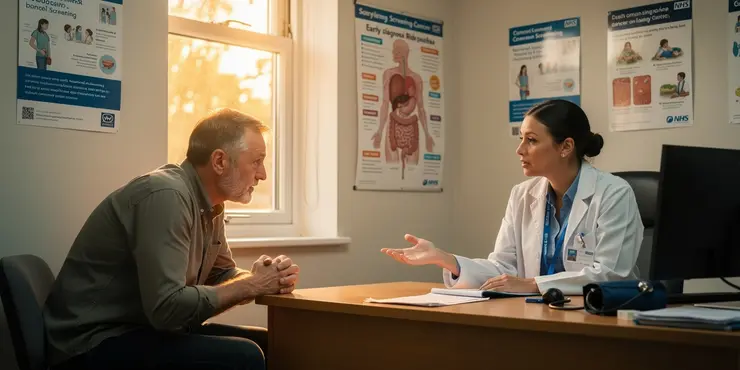
How is bowel cancer diagnosed?
Relevance: 50%
-
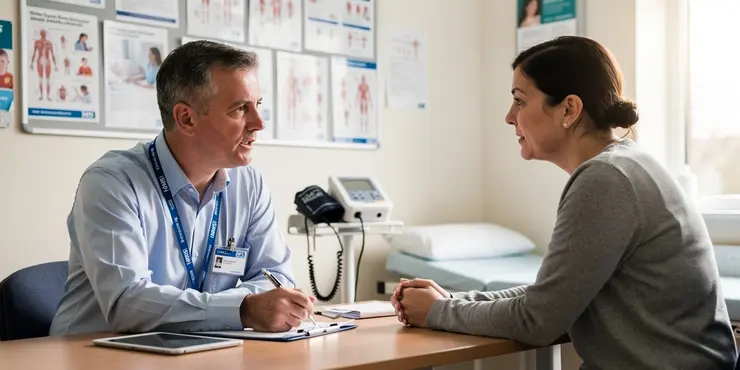
Why is there a surge in bowel cancer?
Relevance: 49%
-
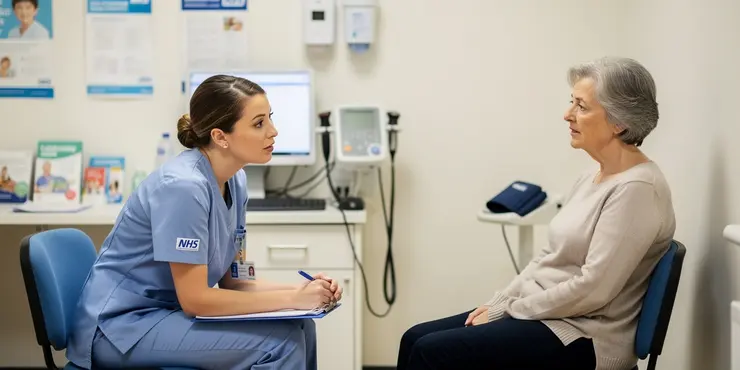
Bowel Cancer
Relevance: 49%
-
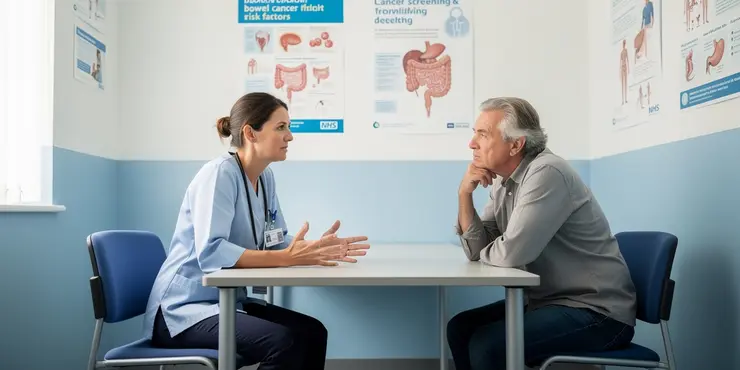
What are the risk factors for bowel cancer?
Relevance: 48%
-
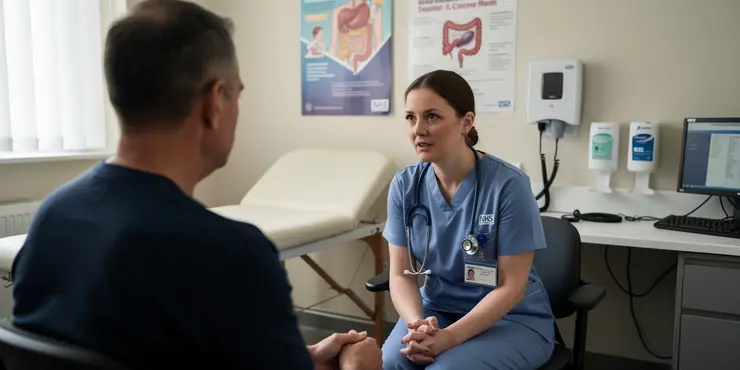
What is the survival rate for bowel cancer?
Relevance: 48%
-
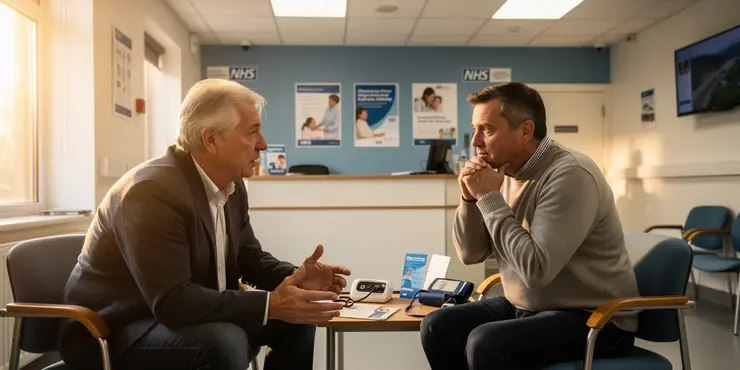
Bowel cancer screening: Alan Titchmarsh and Tommy Walsh | NHS
Relevance: 47%
-
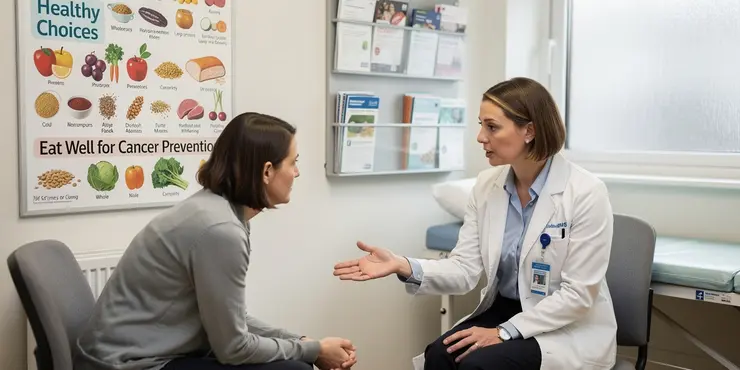
Can lifestyle changes help reduce bowel cancer risk?
Relevance: 47%
-
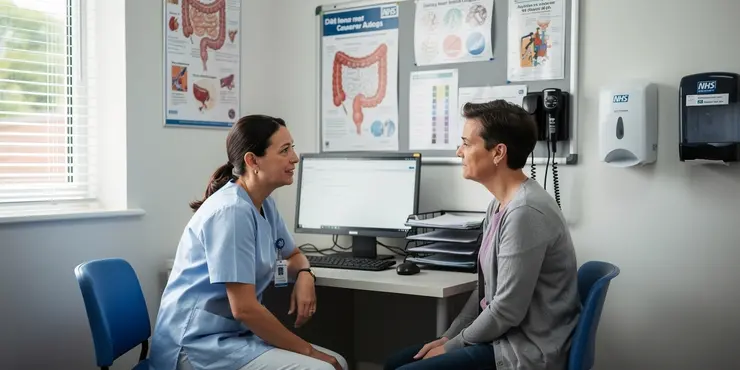
How is the stage of bowel cancer determined?
Relevance: 46%
-
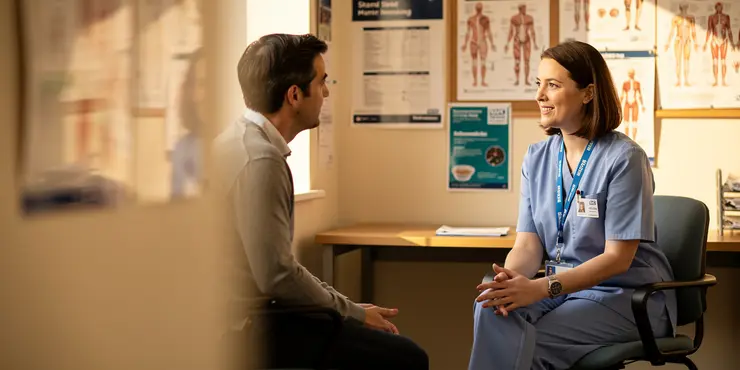
What treatment options are available for bowel cancer?
Relevance: 46%
-

Taking a Genetic Family History - The Conversation (Bowel Cancer)
Relevance: 45%
-
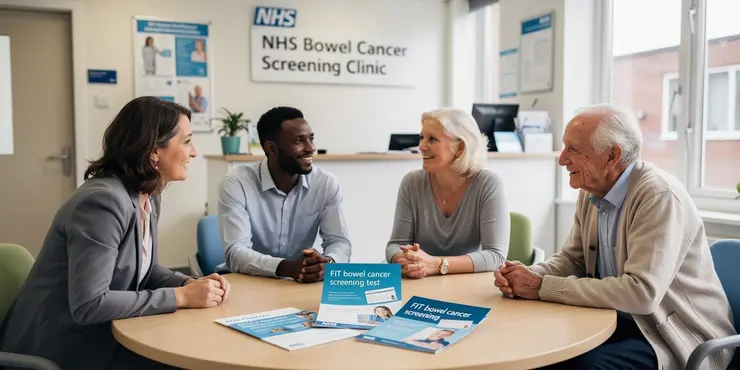
How to do the FIT bowel cancer screening test | Cancer Research UK
Relevance: 45%
-
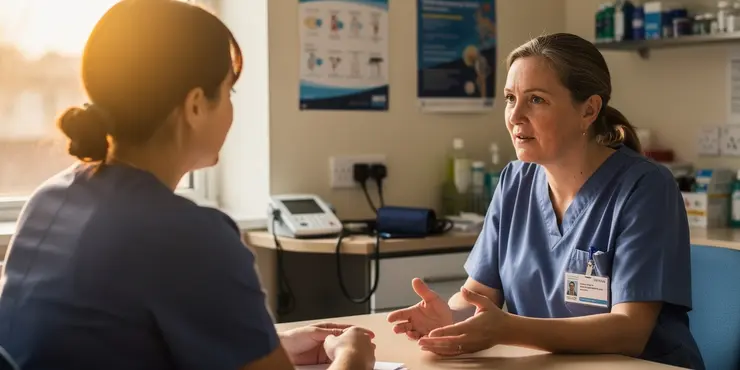
What are the side effects of bowel cancer treatment?
Relevance: 45%
-

Ovarian cancer - signs and symptoms to look out for
Relevance: 45%
-
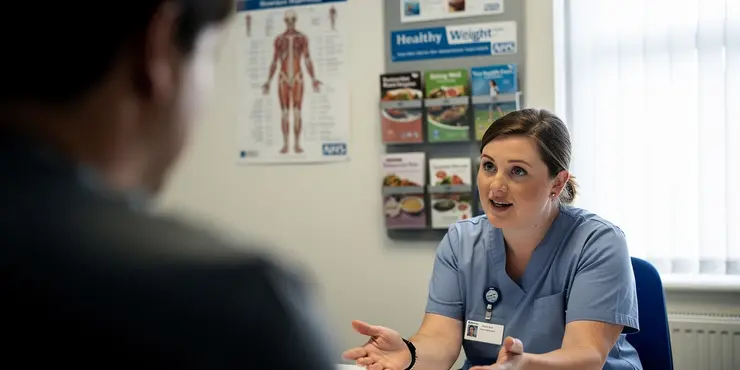
How does obesity affect bowel cancer rates?
Relevance: 45%
-
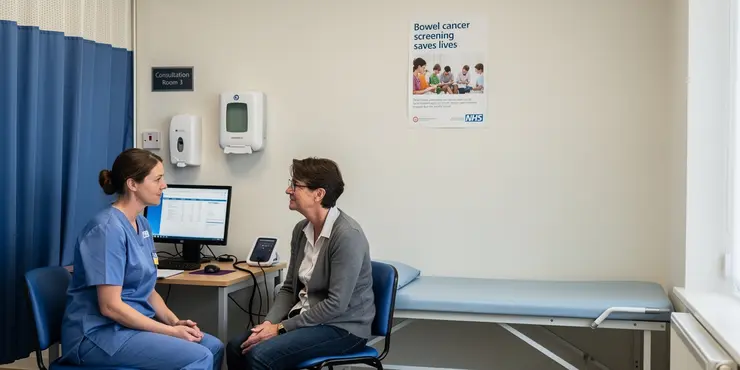
How does increased screening impact bowel cancer statistics?
Relevance: 45%
-

Are there specific benefits of exercise for bowel cancer survivors?
Relevance: 45%
-
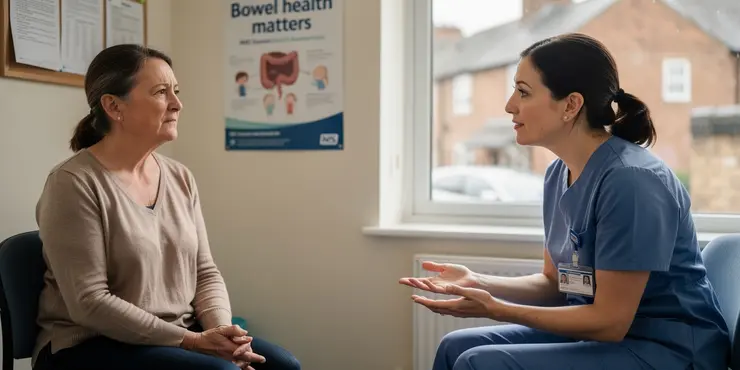
Can bowel cancer spread to other parts of the body?
Relevance: 45%
-
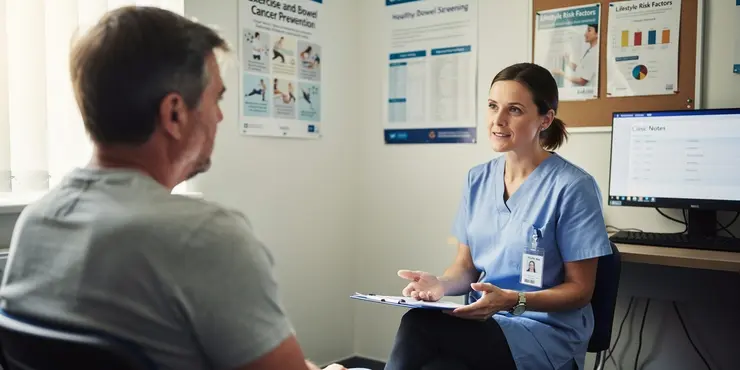
How does exercise impact bowel cancer progression?
Relevance: 45%
-
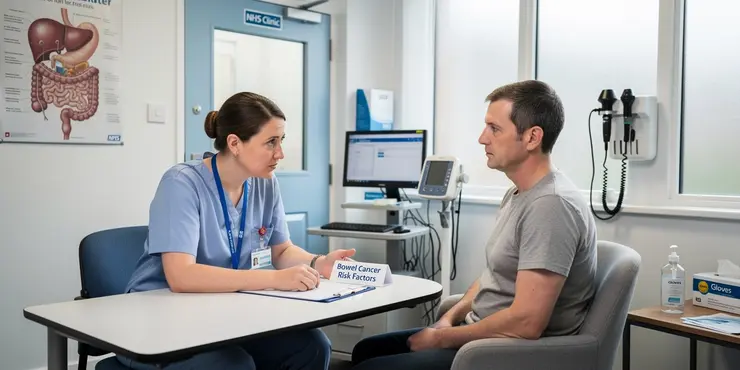
What factors are contributing to the increase in bowel cancer cases?
Relevance: 44%
-
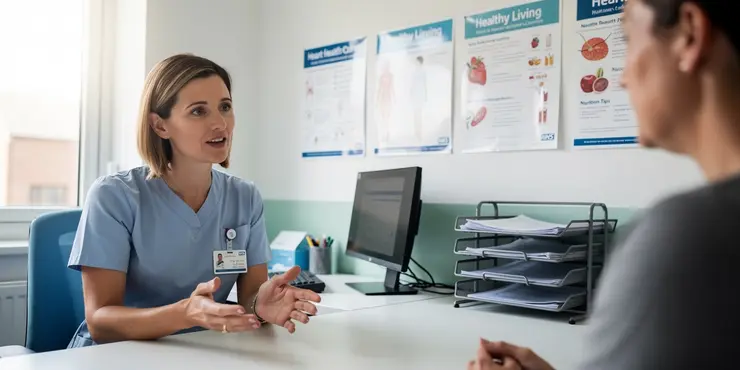
What lifestyle changes can help lower the risk of bowel cancer?
Relevance: 44%
-

What support is available for individuals diagnosed with bowel cancer?
Relevance: 44%
-

How does family history affect the risk of bowel cancer?
Relevance: 44%
-
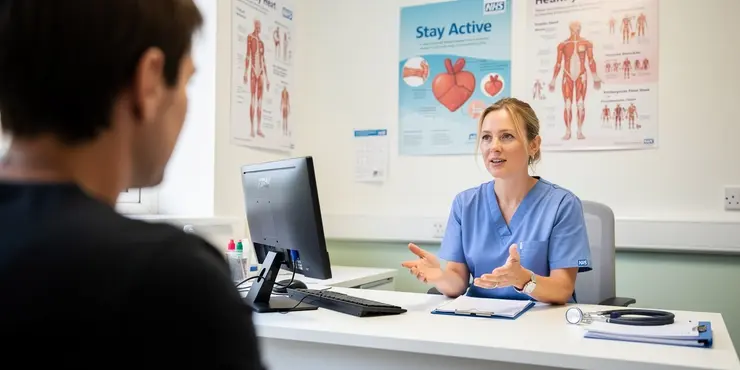
What types of exercise are beneficial for bowel cancer patients?
Relevance: 43%
-

Can exercise help slow down the progression of bowel cancer?
Relevance: 43%
-

Can exercise help slow down the progression of bowel cancer?
Relevance: 43%
-
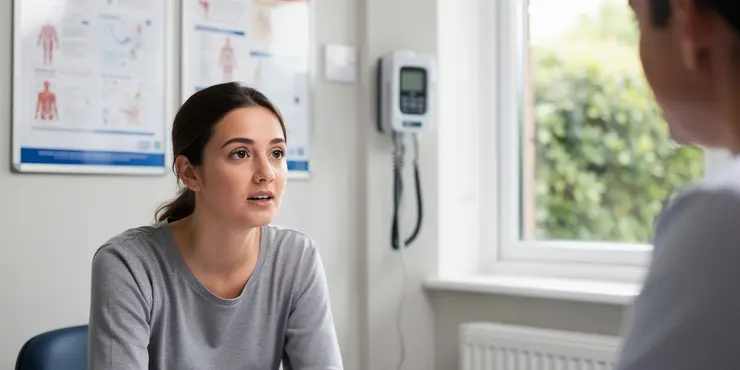
Are younger people being diagnosed with bowel cancer more frequently?
Relevance: 43%
-
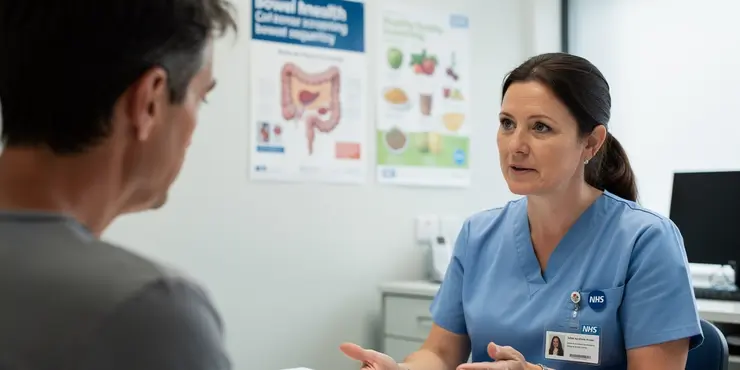
What role does diet play in the risk of developing bowel cancer?
Relevance: 43%
-
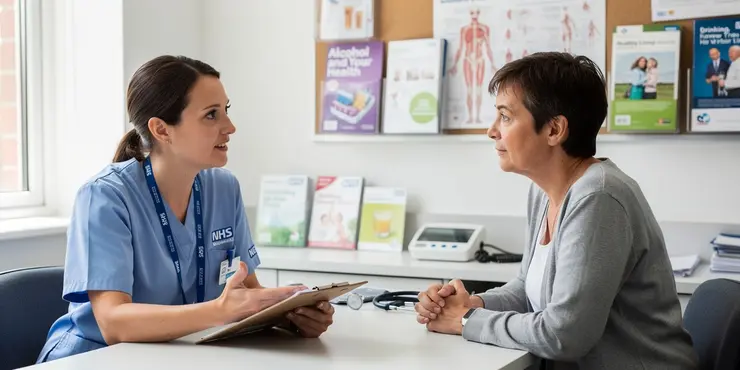
What role does alcohol consumption play in bowel cancer risk?
Relevance: 43%
-
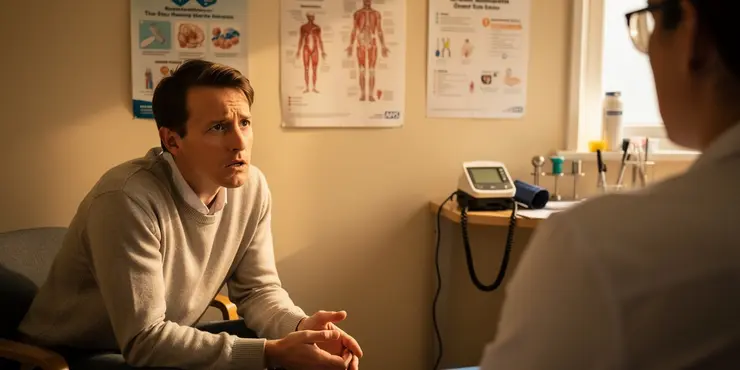
Worried about signs that could be cancer? Contact your GP practice | NHS
Relevance: 39%
-

About Breast cancer - signs and symptoms | NHS
Relevance: 38%
-
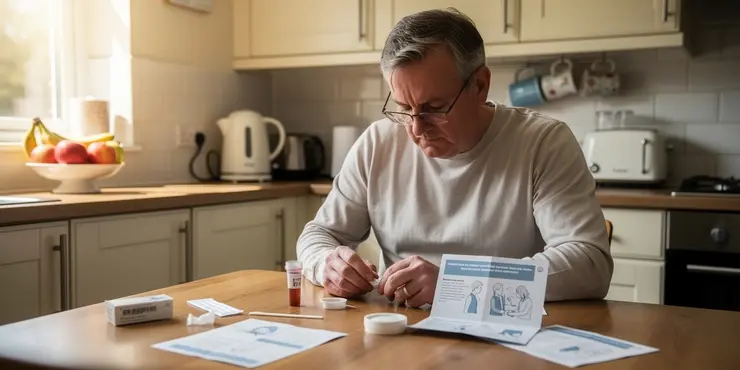
How to use the bowel cancer screening FIT kit | NHS
Relevance: 37%
-
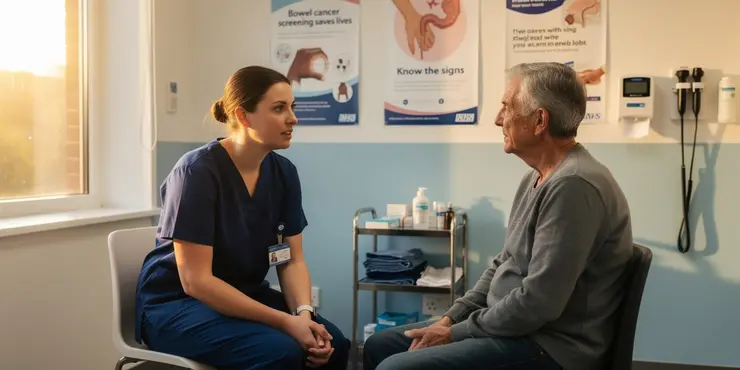
Bowel Cancer
Relevance: 35%
-
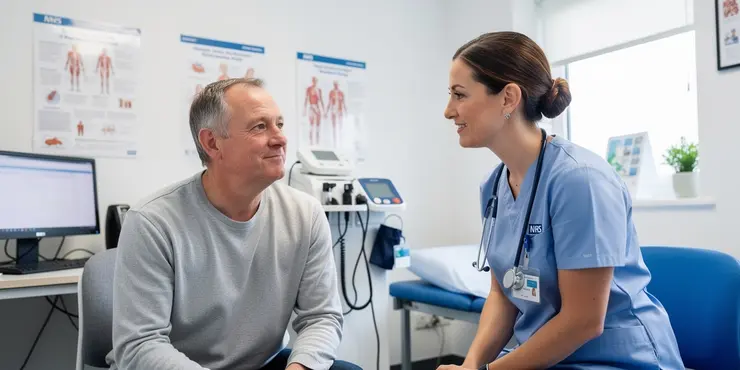
Bowel Cancer
Relevance: 35%
About Bowel Cancer
Bowel cancer, also known as colorectal cancer or colon cancer, is a type of cancer that starts in the colon or rectum. It usually develops from polyps, which are small growths on the inner lining of the colon or rectum. While not all polyps turn into cancer, some do over time, making regular screenings and early detection important for prevention and treatment.
Causes and Risk Factors:
- Age: The risk of bowel cancer increases with age, with most cases occurring in people over 50.
- Family History: Individuals with a family history of bowel cancer or certain genetic syndromes like familial adenomatous polyposis (FAP) or Lynch syndrome are at higher risk.
- Diet and Lifestyle: A diet high in red and processed meats, low in fiber, obesity, lack of physical activity, smoking, and heavy alcohol consumption can increase the risk.
- Inflammatory Bowel Disease (IBD): Conditions like Crohn's disease and ulcerative colitis increase the risk of developing bowel cancer.
Symptoms:
- Change in Bowel Habits: Persistent diarrhea or constipation, or a change in the consistency of stool.
- Blood in Stool: Blood may appear bright red or dark, and may be accompanied by rectal bleeding or blood in the toilet.
- Abdominal Discomfort: Persistent abdominal discomfort, such as cramps, gas, or pain.
- Unexplained Weight Loss: Significant and unexplained weight loss without any dietary changes or increased exercise.
- Fatigue: Persistent tiredness or weakness.
- Iron Deficiency Anemia: Low red blood cell count due to chronic blood loss.
Diagnosis:
- Colonoscopy: A procedure in which a flexible tube with a camera is inserted into the rectum to examine the colon and rectum for polyps or cancerous growths.
- Biopsy: If suspicious areas are found during a colonoscopy, a biopsy may be taken to confirm the presence of cancerous cells.
- Blood Tests: Blood tests may be done to check for anemia or to assess liver function, as bowel cancer can spread to the liver.
Treatment:
- Surgery: The primary treatment for bowel cancer involves removing the cancerous tumor along with a portion of healthy tissue. In some cases, nearby lymph nodes may also be removed.
- Chemotherapy: Chemotherapy may be recommended before or after surgery to kill cancer cells or shrink the tumor.
- Radiation Therapy: Radiation therapy may be used to target and destroy cancer cells, especially if the cancer has spread beyond the colon or rectum.
- Targeted Therapy: Drugs that target specific abnormalities within cancer cells may be used in combination with chemotherapy or alone.
- Immunotherapy: Immunotherapy drugs help the body's immune system fight cancer cells and may be used in some cases.
Prevention:
- Screening: Regular screenings, such as colonoscopies, can help detect precancerous polyps or early-stage cancer when treatment is most effective.
- Healthy Lifestyle: Eating a balanced diet high in fruits, vegetables, and whole grains, maintaining a healthy weight, exercising regularly, limiting alcohol consumption, and avoiding tobacco can reduce the risk of developing bowel cancer.
- Medication: Some medications, such as aspirin or nonsteroidal anti-inflammatory drugs (NSAIDs), may reduce the risk of developing bowel cancer in certain individuals, but they should only be used under medical supervision.
Early detection and treatment of bowel cancer can significantly improve outcomes and increase the chances of survival. It's important to consult with a healthcare professional about individual risk factors and screening recommendations.
Learn about Bowel Cancer (British Sign Language Version)
Understanding Bowel Cancer
Bowel cancer, also known as colorectal cancer, affects the large bowel, which is made up of the colon and rectum. It is one of the most common types of cancer diagnosed in the United Kingdom. Early detection and treatment are crucial to improve the chances of a full recovery.
Symptoms of Bowel Cancer
Common symptoms can include blood in the stool, a persistent change in bowel habits (such as constipation or diarrhoea), abdominal pain, and unexplained weight loss. It is important to consult with a healthcare professional if any of these symptoms are observed.
Importance of Screening
Regular screening is vital for early detection. In the UK, the NHS provides bowel cancer screening to individuals between 60 and 74 years old. This can involve a faecal immunochemical test (FIT) that checks for hidden blood in the stool. Early detection through screening significantly improves treatment success.
Treatments for Bowel Cancer
Treatment options typically include surgery, chemotherapy, radiotherapy, and targeted therapies. The choice of treatment depends on the stage and location of the cancer, as well as the overall health of the patient. A multidisciplinary team will recommend the best approach for each individual.
Support and Resources
Various organisations offer support and information for those affected by bowel cancer. Bowel Cancer UK and Macmillan Cancer Support provide resources, financial assistance, and emotional support. For those using British Sign Language, many services include sign language interpreters to ensure accessible information.
Accessing British Sign Language Resources
For individuals who are deaf or hard of hearing, resources are available in British Sign Language (BSL). Bowel Cancer UK offers BSL videos that cover symptoms, screening processes, and treatment options. These resources ensure that crucial health information is accessible to the entire community.
About Bowel Cancer
Bowel cancer is a type of cancer that starts in the large intestine (colon) or the end part (rectum). It can begin as small growths called polyps inside the colon or rectum. Not all polyps become cancer, but some do. That is why it's important to check for them regularly so they can be treated early.
Causes and Risk Factors:
- Age: People over 50 are more likely to get bowel cancer.
- Family History: If others in your family had bowel cancer, you could be at higher risk. Some genetic conditions also increase risk.
- Diet and Lifestyle: Eating a lot of red and processed meats, not eating enough fiber, being overweight, not exercising enough, smoking, and drinking a lot of alcohol can increase risk.
- Inflammatory Bowel Disease (IBD): Conditions like Crohn's disease or ulcerative colitis can increase risk.
Symptoms:
- Change in Bowel Habits: You might have diarrhea or constipation often, or notice a change in your stool.
- Blood in Stool: You might see bright red or dark blood in your stool or in the toilet.
- Abdominal Discomfort: You may feel cramps, gas, or pain in your belly that doesn't go away.
- Unexplained Weight Loss: You might lose a lot of weight without dieting or exercising more.
- Fatigue: You might feel very tired or weak all the time.
- Iron Deficiency Anemia: You could become anemic, meaning you have fewer red blood cells because of blood loss.
Diagnosis:
- Colonoscopy: A doctor uses a long, flexible tube with a camera to look inside your colon and rectum for polyps or cancer.
- Biopsy: If something suspicious is found during a colonoscopy, a small piece of tissue is taken to see if there are cancer cells.
- Blood Tests: Tests can check for anemia or see if the cancer has spread to your liver.
Treatment:
- Surgery: Doctors take out the cancer and some healthy tissue around it. Sometimes, they also remove nearby lymph nodes.
- Chemotherapy: Medicine is used to kill cancer cells, which may be given before or after surgery.
- Radiation Therapy: High-energy rays are used to kill cancer cells, especially if the cancer spread beyond the colon or rectum.
- Targeted Therapy: Special drugs that attack cancer cells are used, sometimes with chemotherapy.
- Immunotherapy: Helps your immune system fight the cancer.
Prevention:
- Screening: Regular checks like colonoscopies can find polyps or early cancer which is easier to treat.
- Healthy Lifestyle: Eat fruits, vegetables, and whole grains, keep a healthy weight, exercise, drink less alcohol, and don’t smoke.
- Medication: Some medicines might help lower the risk, but only take them if a doctor advises it.
Catching bowel cancer early can help treatment work better. It is important to talk to a doctor to understand your risk and decide how often to get checked.
Learn about Bowel Cancer (British Sign Language Version)
Understanding Bowel Cancer
Bowel cancer is a sickness that happens inside your tummy. It affects the big tube called the bowel. It is common in the UK. Finding it early is very important. The sooner it is found, the better the chances to get better.
Symptoms of Bowel Cancer
If you see blood when you go to the toilet, if your toilet habits change (like having loose or hard poo), if you have tummy pain, or if you lose weight without trying, you should visit a doctor. It is important to talk to a healthcare professional if you have these signs.
Importance of Screening
Checking for bowel cancer regularly is very important. In the UK, people 60 to 74 years old get free checks from the NHS. This check looks for hidden blood in your poo. Finding cancer early means that treatment can work better.
Treatments for Bowel Cancer
You can have surgery, special strong medicines (called chemotherapy), or special light treatment (called radiotherapy) to treat bowel cancer. The kind of treatment you get depends on how serious the cancer is and your overall health. Doctors will suggest the best plan for you.
Support and Resources
There are groups that can help people with bowel cancer. Bowel Cancer UK and Macmillan Cancer Support give advice, money help, and support. Some services have people who can use sign language to help with communication.
Accessing British Sign Language Resources
If you are deaf or have trouble hearing, you can get information in British Sign Language (BSL). Bowel Cancer UK has videos in BSL that explain signs, checks, and treatments. This helps everyone to understand and stay healthy.
Frequently Asked Questions
What is bowel cancer?
Bowel cancer, also known as colorectal cancer, is a type of cancer that begins in the large bowel (colon) or rectum.
What are the symptoms of bowel cancer?
Symptoms can include changes in bowel habits, blood in your stools, abdominal pain, and unexplained weight loss.
Who is at risk of developing bowel cancer?
Risk factors include being over the age of 50, having a family history of bowel cancer, certain genetic conditions, a diet high in red or processed meats, smoking, and heavy alcohol consumption.
How is bowel cancer diagnosed?
Diagnosis can involve a variety of tests including a physical examination, blood tests, colonoscopy, and imaging scans like CT and MRI.
Can bowel cancer be treated?
Yes, bowel cancer can be treated, particularly if detected early. Treatment options include surgery, chemotherapy, radiotherapy, and targeted therapies.
What are the stages of bowel cancer?
Bowel cancer stages range from stage 0 (very early cancer) to stage 4 (cancer that has spread to other parts of the body).
How can I reduce my risk of bowel cancer?
Reducing your risk involves a healthy diet high in fibre, regular exercise, maintaining a healthy weight, limiting alcohol consumption, and not smoking.
Is bowel cancer hereditary?
Some types of bowel cancer can be hereditary, particularly those linked to genetic conditions like Lynch syndrome or familial adenomatous polyposis (FAP).
What is the survival rate for bowel cancer?
Survival rates for bowel cancer vary depending on stage at diagnosis and other factors. Early detection significantly improves the chances of successful treatment.
What role does diet play in preventing bowel cancer?
A diet high in fibre, fruits, and vegetables and low in red and processed meats can help lower the risk of developing bowel cancer.
Are there screening programmes for bowel cancer in the UK?
Yes, there are national screening programmes. Individuals between the ages of 60 and 74 are invited to undergo regular screening, and a new test called FIT (Faecal Immunochemical Test) is being used.
What should I do if I have symptoms of bowel cancer?
If you experience symptoms, it is important to see your GP as soon as possible for assessment and potential referral for further testing.
How often should I undergo bowel cancer screening?
In the UK, individuals are usually invited to undergo screening every two years between the ages of 60 and 74. Depending on risk factors, more frequent screening may be recommended.
What treatments are available for advanced bowel cancer?
For advanced bowel cancer, treatments may include chemotherapy, targeted therapies, and sometimes surgery to remove the cancer or relieve symptoms.
Can lifestyle changes prevent bowel cancer recurrence?
Adopting a healthy lifestyle with a balanced diet, regular physical activity, quitting smoking, and reducing alcohol intake can help reduce the risk of recurrence.
What is bowel cancer?
Bowel cancer is when some cells inside the bowel grow the wrong way. This can make you feel unwell.
If you are worried, talk to a doctor or nurse. They can help you understand more.
Use pictures or videos to help you learn.
Ask someone you trust to read and talk with you about this.
Bowel cancer is cancer that starts in the big intestine or bottom (rectum). It is also called colorectal cancer.
What are the signs of bowel cancer?
Bowel cancer might make you feel sick in different ways. It is important to know what these signs are, so you can see a doctor if you need to. Here are some common signs to look out for:
- Tummy pain or cramps that keep coming back
- Changes in how often you need to poo, like going more often or having very soft poo
- Blood in your poo
- Feeling very tired all the time
- Losing weight without trying
If you notice any of these signs, talk to a doctor. A doctor can help find out if something is wrong. You can also ask someone you trust to go with you to the doctor if it makes you feel better.
It might help to write down how you feel or ask someone to help you keep track of the signs you have.
Some signs to watch for are: going to the toilet differently, seeing blood in your poo, having a tummy ache, and losing weight without trying.
Who can get bowel cancer?
Some people are more likely to get bowel cancer. Here are some things that can make the risk higher:
- Being older than 50 years.
- Having family members who had bowel cancer.
- Eating a lot of red or processed meat.
- Not eating enough fruits and vegetables.
- Not exercising much.
- Being very overweight.
- Smoking cigarettes.
- Drinking a lot of alcohol.
If you are worried, you can talk to a doctor or nurse. They can help you understand more and tell you what to do next.
Using pictures or drawings can help make it easier to understand. A friend or family member can also help read this with you.
If you are over 50, you might have more risk for bowel cancer. If someone in your family has had it, your risk is higher too. Some health problems you get from your parents can also increase risk. Eating a lot of red or processed meats is not good. Smoking and drinking too much alcohol can also increase your chances of getting bowel cancer.
How do doctors find out if someone has bowel cancer?
Doctors use special tests to check for bowel cancer. These tests help them see if there is any cancer in the bowel.
Here are some ways doctors might look for bowel cancer:
- A doctor might ask questions about how you feel and your health.
- A doctor might check your body by feeling your belly.
- A doctor might use a tiny camera to look inside your bowel. This is called a colonoscopy.
- A doctor might use scans like X-rays or MRI to take pictures of the inside of your body.
These tools help doctors find out if there is a problem. If you have questions, it is good to ask a doctor or nurse for help. They can explain things in a way that is easy to understand.
Doctors use different tests to find out what is wrong. They might:
- Look at your body carefully (this is called a physical examination).
- Take a bit of your blood to test it.
- Look inside your tummy with a special camera (this is called a colonoscopy).
- Take pictures of the inside of your body using machines like CT and MRI scanners.
If you need help understanding these tests, you can ask your doctor to explain them slowly. You can also use picture stories or videos on the internet to see how they are done.
Can doctors help if you have bowel cancer?
Yes, doctors can help if you have bowel cancer. There are different ways to treat it.
Talk to your doctor. They will explain what is best for you. They might use medicine, surgery, or other treatments.
If you find it hard to understand, ask someone you trust to go with you. They can help explain things to you.
Bowel cancer can be treated. It is easier to treat if found early. There are different ways to treat it. These ways include:
- An operation to take out the cancer.
- Medicine to kill cancer cells, called chemotherapy.
- Strong beams of light to kill cancer cells, called radiotherapy.
- Special medicine that finds and attacks cancer cells, called targeted therapies.
If you or someone you know has bowel cancer, talk to a doctor. They can help you choose the best treatment. It might also help to use tools like videos or picture books to understand better.
What are the steps of bowel cancer?
Bowel cancer happens in steps. Here is how it works:
- Step 1: The cancer is small and only in the bowel.
- Step 2: The cancer grows and might spread to the nearby areas.
- Step 3: The cancer spreads to nearby lymph nodes. Lymph nodes are tiny glands that help fight germs.
- Step 4: The cancer spreads to other parts of the body.
Use a picture chart or simple drawing to help you understand these steps.
It helps to talk with a doctor or nurse if you have questions.
Bowel cancer has different stages. It starts with stage 0, which is very early cancer. Stage 4 is when cancer has spread to other parts of the body.
How can I make my chances of getting bowel cancer smaller?
To stay healthy, eat lots of foods with fiber. Exercise often. Keep your weight healthy. Drink less alcohol. Don't smoke.
Can you get bowel cancer from your family?
Bowel cancer can sometimes be passed down in families. This means if someone in your family has it, you might get it too. It's important to know this so you can get checked by a doctor.
If you are worried, talk to a doctor or a nurse. They can help you understand. Writing down any family history of cancer might help the doctor.
Using pictures or lists can make it easier to remember important information. You can also ask a friend or family member to come with you to the doctor for support.
Sometimes, bowel cancer runs in the family. This can happen if there are genetic conditions like Lynch syndrome or familial adenomatous polyposis (FAP).
How many people live after having bowel cancer?
Bowel cancer is a sickness in the belly. Some people get better after treatment.
If you want help understanding, you can:
- Ask a doctor or nurse to explain.
- Look at pictures or videos about bowel cancer.
- Talk to someone who had bowel cancer and got better.
How well someone gets better from bowel cancer depends on when doctors find it and other things. Finding bowel cancer early gives a much better chance of getting better.
How can food help stop bowel cancer?
Eating lots of fruits, vegetables, and foods with fibre is good for your tummy. Try to eat less red meat and foods like bacon or sausages. This can help keep your tummy healthy and lower the chance of getting a serious illness.
Is there a test for bowel cancer in the UK?
Yes, there is a test for bowel cancer in the UK.
It helps doctors look for signs of bowel cancer.
You might get a test in the post when you are over a certain age.
To understand more, ask a doctor or look at a health website with a helper.
Yes, there are health checks for everyone. People who are between 60 and 74 years old can go for these checks. A new test called FIT is used to check your health.
What should I do if my tummy feels unwell because of cancer?
If your tummy hurts and you think it might be cancer, here’s what you can do:
- Tell a grown-up you trust about how you feel. This could be a parent, teacher, or nurse.
- If you can, go see a doctor. Doctors are there to help you feel better.
- You can write down your feelings or draw pictures to help explain.
- Take deep breaths and try to stay calm. Getting help is the best thing to do.
Remember, there are people who can help you, so you don’t have to feel alone. You can also use simple talking aids or picture charts to share your feelings with others.
If you feel unwell, go visit your doctor. They can check what is wrong and decide if you need more tests.
How often should I get checked for bowel cancer?
It is good to get checked for bowel cancer every few years. This is called a screening.
Ask your doctor how often you need to do this. They can tell you what is best for you.
Use a calendar or set a reminder to help you remember when to get your check-up.
In the UK, people aged 60 to 74 are usually asked to have a health check every two years. If there are risk factors, doctors might ask them to have more health checks.
What treatments can help with advanced bowel cancer?
Bowel cancer is a disease in the bum and tummy area. When cancer gets worse, it's called advanced. There are treatments to help people with advanced bowel cancer feel better.
Some treatments use medicine to kill cancer, like chemotherapy. This medicine goes all over the body to fight cancer.
There is also medicine to stop cancer from growing, called targeted therapy. It finds cancer cells and stops them.
Another way is radiation. It uses strong rays to hit cancer cells and make them go away.
Sometimes, doctors do surgery. Surgery takes out the parts of the body where the cancer is.
Doctors decide which treatment is best. They talk about what might work best for each person.
If you're unsure or have questions, it's okay to ask a doctor. Family can help too.
If someone has serious bowel cancer, doctors might use special medicine called chemotherapy. They might also use special treatments that target the cancer. Sometimes, they might also do surgery to take out the cancer or help with symptoms.
Can changing how you live stop bowel cancer from coming back?
Living healthy is important. Eat good foods, move your body often, don't smoke, and drink less alcohol. Doing this can help you stay well.
Useful Links
This website offers general information and is not a substitute for professional advice.
Always seek guidance from qualified professionals.
If you have any medical concerns or need urgent help, contact a healthcare professional or emergency services immediately.
Some of this content was generated with AI assistance. We’ve done our best to keep it accurate, helpful, and human-friendly.
- Ergsy carfully checks the information in the videos we provide here.
- Videos shown by Youtube after a video has completed, have NOT been reviewed by ERGSY.
- To view, click the arrow in centre of video.
- Most of the videos you find here will have subtitles and/or closed captions available.
- You may need to turn these on, and choose your preferred language.
- Go to the video you'd like to watch.
- If closed captions (CC) are available, settings will be visible on the bottom right of the video player.
- To turn on Captions, click settings .
- To turn off Captions, click settings again.
More Items From Ergsy search
-

Learn about bowel cancer (British Sign Language version)
Relevance: 100%
-

Is the DVSA Theory Test available in British Sign Language (BSL)?
Relevance: 73%
-

Bowel cancer - Symptoms and signs to look out for
Relevance: 63%
-

What is Bowel Cancer?
Relevance: 53%
-

Can bowel cancer be prevented?
Relevance: 52%
-

Is diet linked to the rise in bowel cancer?
Relevance: 51%
-

How common is bowel cancer?
Relevance: 50%
-

How is bowel cancer diagnosed?
Relevance: 50%
-

Why is there a surge in bowel cancer?
Relevance: 49%
-

Bowel Cancer
Relevance: 49%
-

What are the risk factors for bowel cancer?
Relevance: 48%
-

What is the survival rate for bowel cancer?
Relevance: 48%
-

Bowel cancer screening: Alan Titchmarsh and Tommy Walsh | NHS
Relevance: 47%
-

Can lifestyle changes help reduce bowel cancer risk?
Relevance: 47%
-

How is the stage of bowel cancer determined?
Relevance: 46%
-

What treatment options are available for bowel cancer?
Relevance: 46%
-

Taking a Genetic Family History - The Conversation (Bowel Cancer)
Relevance: 45%
-

How to do the FIT bowel cancer screening test | Cancer Research UK
Relevance: 45%
-

What are the side effects of bowel cancer treatment?
Relevance: 45%
-

Ovarian cancer - signs and symptoms to look out for
Relevance: 45%
-

How does obesity affect bowel cancer rates?
Relevance: 45%
-

How does increased screening impact bowel cancer statistics?
Relevance: 45%
-

Are there specific benefits of exercise for bowel cancer survivors?
Relevance: 45%
-

Can bowel cancer spread to other parts of the body?
Relevance: 45%
-

How does exercise impact bowel cancer progression?
Relevance: 45%
-

What factors are contributing to the increase in bowel cancer cases?
Relevance: 44%
-

What lifestyle changes can help lower the risk of bowel cancer?
Relevance: 44%
-

What support is available for individuals diagnosed with bowel cancer?
Relevance: 44%
-

How does family history affect the risk of bowel cancer?
Relevance: 44%
-

What types of exercise are beneficial for bowel cancer patients?
Relevance: 43%
-

Can exercise help slow down the progression of bowel cancer?
Relevance: 43%
-

Can exercise help slow down the progression of bowel cancer?
Relevance: 43%
-

Are younger people being diagnosed with bowel cancer more frequently?
Relevance: 43%
-

What role does diet play in the risk of developing bowel cancer?
Relevance: 43%
-

What role does alcohol consumption play in bowel cancer risk?
Relevance: 43%
-

Worried about signs that could be cancer? Contact your GP practice | NHS
Relevance: 39%
-

About Breast cancer - signs and symptoms | NHS
Relevance: 38%
-

How to use the bowel cancer screening FIT kit | NHS
Relevance: 37%
-

Bowel Cancer
Relevance: 35%
-

Bowel Cancer
Relevance: 35%


